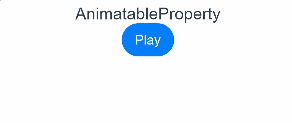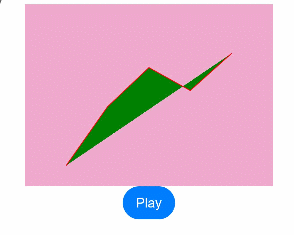@AnimatableExtend装饰器:定义可动画属性
@AnimatableExtend装饰器用于自定义可动画的属性方法,在这个属性方法中修改组件不可动画的属性。在动画执行过程时,通过逐帧回调函数修改不可动画属性值,让不可动画属性也能实现动画效果。
-
可动画属性:如果一个属性方法在animation属性前调用,改变这个属性的值可以生效animation属性的动画效果,这个属性称为可动画属性。比如height、width、backgroundColor、translate属性,Text组件的fontSize属性等。
-
不可动画属性:如果一个属性方法在animation属性前调用,改变这个属性的值不能生效animation属性的动画效果,这个属性称为不可动画属性。比如Ployline组件的points属性等。
说明:
该装饰器从API Version 10开始支持。后续版本如有新增内容,则采用上角标单独标记该内容的起始版本。
装饰器使用说明
语法
@AnimatableExtend(UIComponentName) function functionName(value: typeName) {
.propertyName(value)
}
- @AnimatableExtend仅支持定义在全局,不支持在组件内部定义。
- @AnimatableExtend定义的函数参数类型必须为number类型或者实现 AnimtableArithmetic<T>接口的自定义类型。
- @AnimatableExtend定义的函数体内只能调用@AnimatableExtend括号内组件的属性方法。
AnimtableArithmetic<T>接口说明
对复杂数据类型做动画,需要实现AnimtableArithmetic<T>接口中加法、减法、乘法和判断相等函数。
| 名称 | 入参类型 | 返回值类型 | 说明 |
|---|---|---|---|
| plus | AnimtableArithmetic<T> | AnimtableArithmetic<T> | 加法函数 |
| subtract | AnimtableArithmetic<T> | AnimtableArithmetic<T> | 减法函数 |
| multiply | number | AnimtableArithmetic<T> | 乘法函数 |
| equals | AnimtableArithmetic<T> | boolean | 相等判断函数 |
使用场景
以下示例实现字体大小的动画效果。
@AnimatableExtend(Text) function animatableFontSize(size: number) {
.fontSize(size)
}
@Entry
@Component
struct AnimatablePropertyExample {
@State fontSize: number = 20
build() {
Column() {
Text("AnimatableProperty")
.animatableFontSize(this.fontSize)
.animation({duration: 1000, curve: "ease"})
Button("Play")
.onClick(() => {
this.fontSize = this.fontSize == 20 ? 36 : 20
})
}.width("100%")
.padding(10)
}
}

以下示例实现折线的动画效果。
class Point {
x: number
y: number
constructor(x: number, y: number) {
this.x = x
this.y = y
}
plus(rhs: Point): Point {
return new Point(this.x + rhs.x, this.y + rhs.y)
}
subtract(rhs: Point): Point {
return new Point(this.x - rhs.x, this.y - rhs.y)
}
multiply(scale: number): Point {
return new Point(this.x * scale, this.y * scale)
}
equals(rhs: Point): boolean {
return this.x === rhs.x && this.y === rhs.y
}
}
class PointVector extends Array<Point> implements AnimatableArithmetic<PointVector> {
constructor(value: Array<Point>) {
super();
value.forEach(p => this.push(p))
}
plus(rhs: PointVector): PointVector {
let result = new PointVector([])
const len = Math.min(this.length, rhs.length)
for (let i = 0; i < len; i++) {
result.push((this as Array<Point>)[i].plus((rhs as Array<Point>)[i]))
}
return result
}
subtract(rhs: PointVector): PointVector {
let result = new PointVector([])
const len = Math.min(this.length, rhs.length)
for (let i = 0; i < len; i++) {
result.push((this as Array<Point>)[i].subtract((rhs as Array<Point>)[i]))
}
return result
}
multiply(scale: number): PointVector {
let result = new PointVector([])
for (let i = 0; i < this.length; i++) {
result.push((this as Array<Point>)[i].multiply(scale))
}
return result
}
equals(rhs: PointVector): boolean {
if (this.length != rhs.length) {
return false
}
for (let i = 0; i < this.length; i++) {
if (!(this as Array<Point>)[i].equals((rhs as Array<Point>)[i])) {
return false
}
}
return true
}
get(): Array<Object[]> {
let result: Array<Object[]> = []
this.forEach(p => result.push([p.x, p.y]))
return result
}
}
@AnimatableExtend(Polyline) function animatablePoints(points: PointVector) {
.points(points.get())
}
@Entry
@Component
struct AnimatablePropertyExample {
@State points: PointVector = new PointVector([
new Point(50, Math.random() * 200),
new Point(100, Math.random() * 200),
new Point(150, Math.random() * 200),
new Point(200, Math.random() * 200),
new Point(250, Math.random() * 200),
])
build() {
Column() {
Polyline()
.animatablePoints(this.points)
.animation({duration: 1000, curve: "ease"})
.size({height:220, width:300})
.fill(Color.Green)
.stroke(Color.Red)
.backgroundColor('#eeaacc')
Button("Play")
.onClick(() => {
this.points = new PointVector([
new Point(50, Math.random() * 200),
new Point(100, Math.random() * 200),
new Point(150, Math.random() * 200),
new Point(200, Math.random() * 200),
new Point(250, Math.random() * 200),
])
})
}.width("100%")
.padding(10)
}
}
